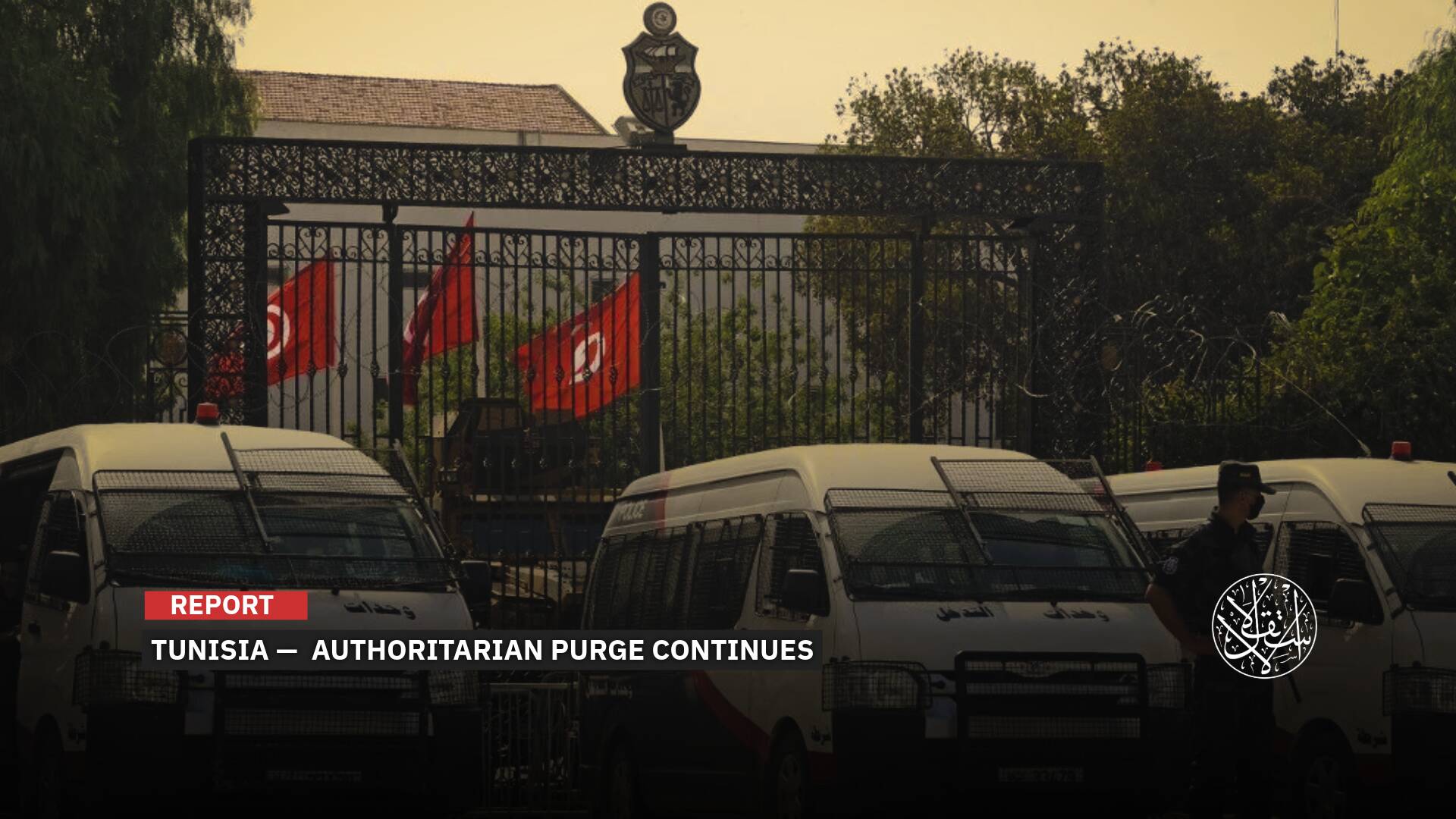Erdoğan Blames Opposition for Desecrating Historic Shahzade Mosque: What Is the Story?

The desecration of the Shahzade Mosque sparked a wave of anger in the Turkish street.
The historic Shahzade Mosque, located in the Fatih district at the heart of Istanbul, was desecrated by supporters of Ekrem Imamoglu, the detained mayor of Istanbul. The acts of vandalism included the destruction of gravestones, graffiti, urination on the mosque’s walls, alcohol consumption, and littering in its courtyards, which face the Sarachane Park, a focal point for Turkish opposition protests.
Istanbul's governor, Davut Gul, accused supporters of the Republican People's Party (CHP) of violating the sanctity of the historic mosque amid the angry demonstrations that erupted on March 19, 2025.
The protests were sparked by the arrest of Imamoglu and several municipal officials, following allegations of corruption and terrorism.
The desecration of the Shahzade Mosque sparked widespread outrage across Turkiye, particularly as it coincided with the arrival of the holy month of Ramadan.
Crowds of citizens gathered outside the mosque, chanting slogans condemning the attack, which they viewed as an affront to their Islamic religious identity.
The opposition protests had already been marred by other actions deemed disrespectful to Islam, including mockery of prayer rituals and deliberate noise disturbances during the Taraweeh prayers.
The crisis reignited the challenging legacy of the Republican People's Party (CHP) regarding religious freedoms during its previous periods in power.
It also harked back to other controversial events since the opposition's victory in the 2019 municipal elections, including the recitation of the Quran and the call to prayer in Turkish.
Additionally, there were incidents such as the filming of alcohol consumption inside a mosque, along with assaults on women wearing hijabs in the streets and on public transport.
Erdogan's Shahzade Visit
On the evening of the desecration of the Shahzade Mosque, a large number of Turks gathered to perform the evening prayer at the mosque.
Protesters expressed their outrage over the vandalism of the mosque and its surroundings through chants and takbir, before proceeding to perform the Taraweeh prayer.
In a surprising turn of events, they were joined by President Recep Tayyip Erdogan, who visited the mosque and participated in the Taraweeh prayers alongside them.

Following the prayers, President Erdogan voiced his objection to the violations that had befallen the mosque, stating, "They turned our mosques into taverns."
The Shahzade Mosque is one of Istanbul’s renowned historical landmarks, situated across from the Greater Istanbul Municipality building on Fuzuli Pasha Street, not far from the famous Sultan Mehmed the Conqueror Mosque.
The construction of the Shahzade Mosque dates back to 1543, when Ottoman Sultan Suleiman the Magnificent ordered its creation in memory of his eldest son, Sehzade Muhammad.
The task of designing the mosque was entrusted to the renowned Turkish architect Mimar Sinan, the chief architect of the Ottoman Empire in the 16th century, who produced numerous significant works throughout his career, most notably his masterpiece, the Selimiye Mosque in Edirne.
The mosque’s courtyard is home to the tombs of several prominent Ottoman figures, including Grand Viziers Rustem and Ibrahim Pasha.
Shahzade Desecration
The desecration of the mosque raised questions from every angle: first, for its affront to Islamic faith; second, for its historical significance as a distinctive cultural landmark; and third, for its implications on Turkish national identity.
"They have crossed their limits and begun to act immorally towards our mosques, in an Islamic country," Turkish Islamic preacher Sheikh Khalil Konakci wrote on X.
"These vile and contemptible enemies of Islam have urinated on the walls of the Shahzade Mosque, drunk alcohol, and some have even climbed onto the dome, brandishing offensive banners."
"I hope these malicious foes of Islam are held to account with the severest punishments for their despicable actions," he added.
Activist Neslihan Koca shared a video showing a group of individuals from the Republican People's Party playing drums and dancing outside the Shahzade Mosque during the Taraweeh prayers.
"They continued in this manner until the prayer ended, then dispersed. It is immoral, rude, and disrespectful," she noted.
A Twitter account under the name Hussein Kilic posted: "A major provocation! I warn the authorities!" He continued, "The vandals showed an unbelievable lack of respect for the Shahzade Mosque, one of the houses of God."
"They are cursing in the mosque's courtyard, writing graffiti on the historic structure, destroying the ancient gravestones, climbing the walls, and chanting political slogans."
"This situation is completely unacceptable! Mosques belong to Muslims, and there can be no tolerance for the mockery of the Kemalist mobs (referring to the followers of Mustafa Kemal Ataturk, the founder of modern Turkiye), leftists, and atheists," he added.
The Turkish activist urged the relevant authorities to take the necessary precautions around the mosque as soon as possible.
Turkish Islamic preacher İhsan Senocak tweeted, "When the city of Bursa was occupied, the Greek officer Sophocles went to the tomb of Osman Gazi and kicked the gravestone."
"My brothers! Do not stand on the same side as Sophocles, who destroyed the gravestones at Shahzade and urinated on the walls of the mosque. Do not let the bones of your ancestors suffer! Disrupt this game," he continued.
Quran Controversy
According to a study conducted by Istanbul's Marmara University on March 21, 2023, 94% of Turks consider themselves religious and believers in God according to Islamic faith.
However, in recent years, there has been a noticeable rise in the targeting of mosques, Islamic rituals, and religious individuals in Turkiye by certain political parties.
For instance, Turkish political and public circles were shocked by the incident of the call to prayer and Quran recitation in Turkish.
This occurred during an event organized by the Istanbul Municipality, headed by Ekrem Imamoglu, on December 17, 2020, marking the 747th anniversary of the death of Jalal al-Din Rumi, a Persian-born poet and Sufi scholar who became a prominent figure in Turkish cultural and religious life.

President Erdogan was at the forefront of critics of the approach taken by the detained Istanbul Mayor, Ekrem Imamoglu.
"The city witnessed a strange incident where the Quran was recited and the call to prayer was made in Turkish," Erdogan said.
"This mentality is the same one that was disturbed by the reopening of Hagia Sophia for worship and the construction of the Camlica Mosque."
"We have seen this mentality that avoids saying 'Allahu Akbar' and 'La ilaha illallah,' and 'Sadaqallahul Azim' in Arabic."
According to Al-Estiklal, Erdogan continued, speaking angrily and directing his remarks at Imamoglu, saying, "Be respectful, and you must pay attention to your actions and language, or the consequences will be dire [...] If you truly believe in the Holy Quran, you must show the respect it deserves."
Attack on Hijab
However, under the pressures of a tense mood, alongside rising racism and resentment spreading like wildfire within Turkiye, incidents targeting religious sanctities have become recurrent.
One such incident involved a Turkish nationalist activist entering a mosque and drinking alcohol inside, defying the feelings of millions of Turkish Muslims.
On September 15, 2023, the individual posted a photo of a bottle of alcohol in front of the "qibla and minbar" on X, tweeting "Ataturk is the greatest."
He then challenged the authorities to review the cameras of 3,200 mosques across the country to try and catch him, if they could.
A few hours later, the police arrested the nationalist activist and released images of him handcuffed on his way to jail.
The incident sparked widespread anger and condemnation across social media, which viewed it as a dangerous sign of a growing wave of hatred targeting religious Turks.
On August 20, 2023, a Turkish woman wearing a hijab was riding a public bus in the province of Kocaeli, adjacent to Istanbul, when she was unexpectedly subjected to a verbal assault by a racist woman.
At the time, I asked her, “Where are you from? Nobody lives like this here in the Republic of Turkey. Go somewhere else.”
The exchange then escalated into a war of words as bystanders intervened, demanding the aggressor stay silent.
One passenger fired back with a biting reproach, “Can you drop the rudeness? What’s it to you if someone wears a headscarf or not? Should I call the police? Shut up and mind your own business.”

‘Ride Camels!’
This incident, which spread rapidly across Turkish media, was far from isolated. Just one day earlier, in another bus—this time in Istanbul’s Besiktas district—a young man confronted a woman hurling racist abuse at a veiled Turkish passenger.
“Go to Saudi Arabia and ride camels,” the woman sneered at the headscarf-wearing passenger.
The young man shot back, “And you go to Greece and ride boats.”
The woman then assaulted the young man, calling him "ill-mannered," and struck his phone, causing it to fall to the ground.
A similar incident occurred on August 31 when a young Turkish man defended a hijab-wearing woman in the Istanbul metro.
This followed an attack on the woman by a secular woman who attempted to remove her hijab.
The situation escalated when the woman physically clashed with the young man after he intervened, telling her, "My mother also wears the hijab; don’t interfere with other people's attire."
On September 14, 2023, a video circulated on social media showing a woman arguing with a hijab-wearing woman, then pursuing another woman walking with her child in an attempt to forcibly remove their hijabs.
Haberler reported that the incident took place in the Esenyurt district of Istanbul. Police arrested the assailant, opened an investigation, and initiated legal proceedings.
These incidents targeting hijab-wearing women have become more frequent, often perpetrated by individuals—both women and men—who view the hijab as foreign to Turkish society.
They adhere to the secular principles of Atatürk, knowing little of Islam beyond its name, and reject any visible expressions of people's connection to the religion.
Atatürk’s Reforms
The clash with Islamic identity in Turkiye is, for some, rooted in the era of Ataturk's reforms, particularly those concerning religion.
This period began when Mustafa Kemal Atatürk, the founder of the modern Turkish state, implemented sweeping changes following his rise to power on October 30, 1923.
These changes touched every aspect of life in the country, establishing a direction that diverged sharply from the policies of the Ottoman Empire, which had ruled for centuries.
Ataturk primarily focused on separating religion from the state, abolishing the Ministry of Religious Affairs and Endowments, closing Islamic schools, and dismantling the sharia courts.
On October 4, 1924, the new civil code was introduced, which banned the hijab and Islamic attire for women, replacing the Ottoman fez with the European-style hat that was popular at the time.
Many Turks remain deeply wary of a return to those days, marked by severe repression of anyone who deviated from this new secular direction.
Former Turkish Prime Minister Adnan Menderes attempted a series of reforms aimed at the country's economy and national identity, the most notable of which were the reopening of "Imam Hatip" schools and the restoration of the call to prayer in Arabic, after it had been recited in Turkish.
This led to the first military coup in the history of the modern republic, and Menderes was executed on September 17, 1961, on the remote island of Yassiada, in an operation carried out by the coup's military generals.
Sources
- Sarachane protests: What is known about the Shahzade Mosque controversy? [Turkish]
- A crowd gathered at the Shahzade Mosque to stand guard against the mosque's desecration. [Turkish]
- The Ottoman " Shahzade" Mosque... the first masterpiece of architect Sinan. [Arabic]
- A Turkish young man defends a hijabi woman. [Arabic]









